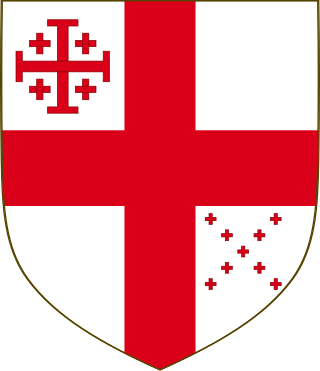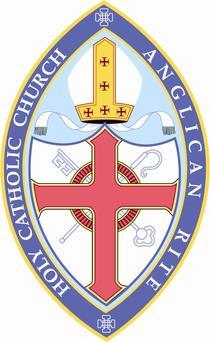The Scottish Episcopal Church is a Christian denomination in Scotland. Scotland's third largest church, the Scottish Episcopal Church has 303 local congregations. It is also an ecclesiastical province of the Anglican Communion.

The Anglican Province of Christ the King (APCK) is a Continuing Anglican church with traditional forms both of doctrine and liturgy. It is considered one of the more Anglo-Catholic jurisdictions among Continuing Anglican church bodies.
The Continuing Anglican movement, also known as the Anglican Continuum, encompasses a number of Christian churches, principally based in North America, that have an Anglican identity and tradition but are not part of the Anglican Communion.
A presiding bishop is an ecclesiastical position in some denominations of Christianity.

The history of the Anglican Communion may be attributed mainly to the worldwide spread of British culture associated with the British Empire. Among other things the Church of England spread around the world and, gradually developing autonomy in each region of the world, became the communion as it exists today.

The Anglican Catholic Church (ACC), also known as the Anglican Catholic Church (Original Province), is a body of Christians in the continuing Anglican movement, which is separate from the Anglican Communion. This denomination is separate from the Anglican Catholic Church in Australia and the Anglican Catholic Church of Canada.
The Holy Catholic Church, Anglican Rite Jurisdiction of the Americas (ARJA) was an Anglican traditionalist church originating in 1981 from within the Anglican Catholic Church (ACC) in the United States and with the assistance of the Philippine Independent Catholic Church (PICC), an offshoot of the mainline Philippine Independent Church. Citing political infighting within the Anglican Catholic Church, four of its clergy sought the help of the Philippine church in consecrating them to be bishops of a daughter province in which each of them would serve as bishop ordinary of a diocese covering one-quarter of the United States.

The Anglican ministry is both the leadership and agency of Christian service in the Anglican Communion. Ministry commonly refers to the office of ordained clergy: the threefold order of bishops, priests and deacons. More accurately, Anglican ministry includes many laypeople who devote themselves to the ministry of the church, either individually or in lower/assisting offices such as lector, acolyte, sub-deacon, Eucharistic minister, cantor, musicians, parish secretary or assistant, warden, vestry member, etc. Ultimately, all baptized members of the church are considered to partake in the ministry of the Body of Christ.
The September 14–16, 1977 Congress of St. Louis was an international gathering of nearly 2,000 Anglicans in St. Louis, Missouri, united in their rejection of theological changes introduced by the Anglican Church of Canada and by the Episcopal Church in the United States of America in its General Convention of 1976. Anglicans who attended this congress felt that these changes amounted to foundational alterations in the American and Canadian provinces of the Anglican Communion and meant that they had "departed from Christ's One, Holy, Catholic and Apostolic Church." Theological liberalism, financial support for political action groups, participation in the Consultation on Church Union (COCU), revisions to the Book of Common Prayer, and the ordination of women priests were not the only reasons for the split, but they were seen by these churches as evidence of the mainline church's departure from Anglican orthodoxy. The idea for a congress originated with the Reverend Canon Albert J. duBois in 1973 in preparation for the Louisville General Convention of the Episcopal Church. Canon duBois and the group called "Anglicans United" toured parishes in advance of the Congress to garner support. In 1976, the Fellowship of Concerned Churchmen, an organization founded in 1973 as a coordinating agent for laypeople and clergy concerned about the breakdown of faith and order within the Episcopal Church and the Anglican Church of Canada, met to organize a Church Congress in St. Louis the following year.
The Convergence Movement, also known as the Ancient-Future Faith, whose foundation is primarily attributed to Robert E. Webber in 1985, is an ecumenical movement. Developed as an effort among evangelical, charismatic and Pentecostal, and liturgical Christians and denominations blending their forms of worship, the movement has been defined for its predominant use of the Anglican tradition's Book of Common Prayer; use from additional liturgical sources common to Lutheranism, Eastern Orthodoxy, and Catholicism have also been employed.
In the United States, the history of the Episcopal Church has its origins in the Church of England, a church which stresses its continuity with the ancient Western church and claims to maintain apostolic succession. Its close links to the Crown led to its reorganization on an independent basis in the 1780s. In the nineteenth and early twentieth centuries, it was characterized sociologically by a disproportionately large number of high status Americans as well as English immigrants; for example, more than a quarter of all presidents of the United States have been Episcopalians. Although it was not among the leading participants of the abolitionist movement in the early 19th century, by the early 20th century its social engagement had increased to the point that it was an important participant in the Social Gospel movement, though it never provided much support for the Prohibitionist movement. Like other mainline churches in the United States, its membership decreased from the 1960s. This was also a period in which the church took a more open attitude on the role of women and toward homosexuality, while engaging in liturgical revision parallel to that of the Roman Catholic Church in the post Vatican II era.

The United Episcopal Church of North America (UECNA) is a church in the Anglican tradition and is part of the Continuing Anglican movement. It is not part of the Anglican Communion.

The Christian Episcopal Church (XnEC) is a Continuing Anglican jurisdiction consisting of parishes in Canada and the United States and with oversight of several parishes in the Cayman Islands. Its bishops claim apostolic succession through the Right Rev. A. Donald Davies. Davies was formerly the bishop-in-charge of the Convocation of American Churches in Europe and the bishop of the Episcopal Diocese of Fort Worth, Texas.
The Communion of Evangelical Episcopal Churches (CEEC) is a Christian convergence communion established in 1995 within the United States of America. With a large international presence in five provinces and seven U.S. dioceses, most of its churches and missions are spread throughout the Mid-Atlantic and Mid-West regions, and South Carolina; Florida and California; and India. The Communion of Evangelical Episcopal Churches is currently led by Bishop Quintin Moore as presiding bishop of the CEEC.

The Episcopal Church (TEC), also officially the Protestant Episcopal Church in the United States of America (PECUSA), is a member church of the worldwide Anglican Communion based in the United States with additional dioceses elsewhere. It is a mainline Protestant denomination and is divided into nine provinces. The presiding bishop of the Episcopal Church is Sean W. Rowe.
Louis Wahl Falk III is the President of the House of Bishops of the Anglican Church in America. Until 2002 he was the primate of the Traditional Anglican Communion, an international body of continuing Anglican churches.

The Holy Catholic Church Anglican Rite (HCCAR), also known as the Anglican Rite Catholic Church, is a body of Christians in the Continuing Anglican movement. It is represented by dioceses and missionary jurisdictions in the United States, Latin America, and India.
Peter Francis Watterson was an American Catholic priest who had formerly been a bishop of the Continuing Anglican movement.
James Orin Mote was a founding member of the Continuing Anglican movement.
The Diocese of the Midwest is the official organization of the Anglican Catholic Church in the Commonwealth of Kentucky; the States of Indiana, Ohio, Michigan, and Wisconsin; the State of Illinois excepting the Counties of Madison, Monroe, Rock Island, St. Clair, and Whiteside; and the Counties of Cabell and Wayne within the State of West Virginia.







